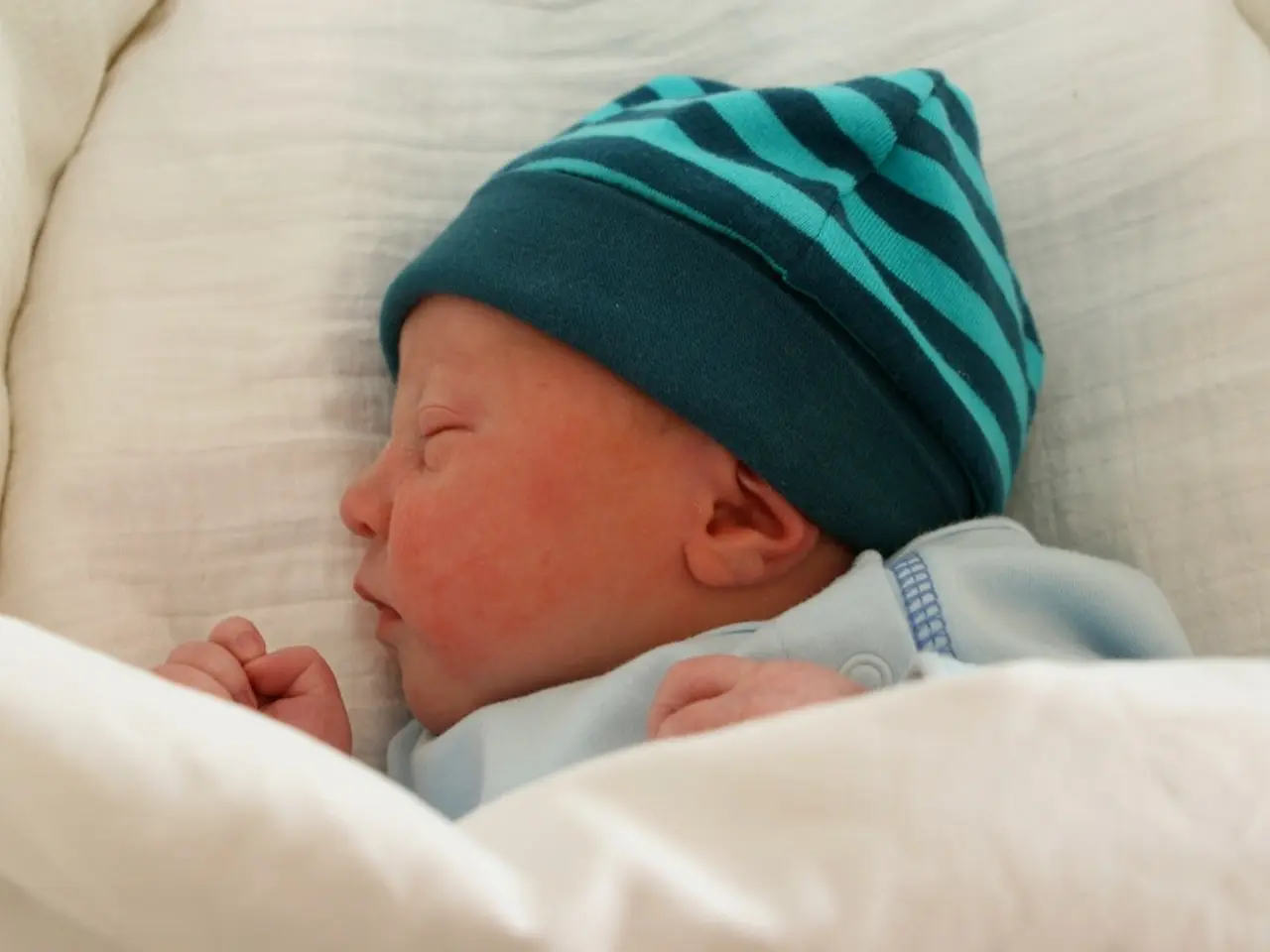Infant's Night-Time Wails: Understanding Normal Behavior and Calming Techniques
Babies and toddlers often cry in their sleep due to various reasons related to their sleep patterns and developmental stages. This article aims to shed light on these factors and provide practical tips for parents to soothe their babies.
1. **Transitioning Between Sleep Cycles:**
Babies have sleep cycles of about 40 minutes, with a high proportion of REM (active) sleep where they may move their limbs, twitch, or even cry briefly. At the end of each sleep cycle, a baby might experience a brief awakening or lighter sleep phase where crying can occur, often without fully waking up[1].
2. **Overtiredness:**
If a baby is awake too long or doesn't get enough sleep, they become overtired. This can trigger the release of hormones that make it harder for them to fall asleep and stay asleep, leading to crying even during sleep. Overtiredness often shows as big tears before falling asleep and can cause crying episodes in sleep cycles[1][3].
3. **Teething Pain:**
Babies experiencing teething may cry in their sleep due to discomfort or pain from their emerging teeth[1].
4. **Sleep Regression and Developmental Changes:**
Around 4 months, many babies go through a sleep regression due to neurological and developmental changes. This can cause difficulty falling asleep, frequent awakenings with crying, irritability upon waking, and reduced total sleep time[2].
5. **Other Factors:**
Colic, overstimulation, gas or digestive discomfort, hunger, or separation anxiety may also contribute to babies crying, including during sleep[3][4].
---
### How Parents Can Soothe Babies Crying in Their Sleep
Parents can take several steps to help soothe their babies when they cry in their sleep:
- **Ensure Adequate Sleep and Manage Awake Times:**
Avoid letting babies become overtired by following age-appropriate awake windows and establishing soothing bedtime routines. For example, young babies often need naps every 60–90 minutes of wakefulness[1][3].
- **Comfort During Transitions:**
Since brief awakenings are normal in sleep cycles, offering gentle reassurance like soft talking, patting, or a pacifier can help babies settle back without fully waking[1].
- **Address Teething Discomfort:**
Using teething rings, gentle gum massage, or pediatrician-recommended remedies can ease teething pain[1].
- **Minimize Overstimulation:**
Limit visitors and busy environments especially near bedtime to help reduce fussiness and crying linked to sensory overload[3].
- **Manage Sleep Regression:**
Be patient during periods like the 4-month sleep regression. Consistent routines, soothing sleep associations, and responsive caregiving can help babies adjust[2].
- **Attend to Hunger and Gas:**
Frequent feeding or cluster feeding in the evening may soothe hunger-related crying. Ensuring proper burping and comfortable positioning can relieve gas discomfort[3].
---
In summary, crying in sleep often reflects normal sleep cycle transitions, overtiredness, or discomfort from developmental factors. Parents can soothe babies by promoting good sleep habits, providing comfort during awakenings, managing potential pain or discomfort, and being responsive to their changing needs[1][2][3][4].
It's essential to remember that sleep patterns in babies and young children vary greatly over the first 3 years of life. Night terrors are relatively rare and usually occur in children aged between 4 and 12 years old. Infants (7-12 months) may need two naps per day well into their second year of life. If concerns about sleep issues persist, caregivers should talk to a doctor for further advice and guidance.
- **Night Terrors:**
Although rare, night terrors can occur in infants aged 7-12 months. During a night terror, a baby might scream, sit up suddenly, and appear frightened or scared, but they won't be fully awake [5].
- **Other Childhood Diseases:**
Some childhood diseases, such as diabetes, HIV, and type 1 diabetes, can disrupt sleep patterns and cause nighttime waking or irregular sleep patterns in toddlers [6].
- Atopic Dermatitis, Eczema, Psoriasis:
Skin conditions like atopic dermatitis (eczema), psoriasis, and other rashes may cause discomfort, leading to sleepinterruptions and crying in sleep [7].
- **Dermatitis and Colitis:**
Symptoms of dermatitis in infants and colitis in toddlers, such as itchy skin, rashes, or stomach distress, can lead to crying during sleep [7][8].
- **Ulcerative Colitis and Crohn's Disease:**
Chronic conditions like ulcerative colitis and Crohn's disease may cause pain, discomfort, and bowel issues that affect sleep quality in older toddlers [8].
- **Mental Health Conditions and Depression:**
In some cases, babies and toddlers may experience symptoms of depression, anxiety, or other mental health conditions that can manifest during sleep as crying or nightmares [9].
- **Predictive Analysis in Health-and-Wellness and Mental-Health:**
With advancements in science and technology, companies like Pfizer are developing predictive analytics tools to help identify patterns and potential warning signs of physical and mental health issues in infants and young children, providing early intervention and improving overall health and sleep quality [9][10].




